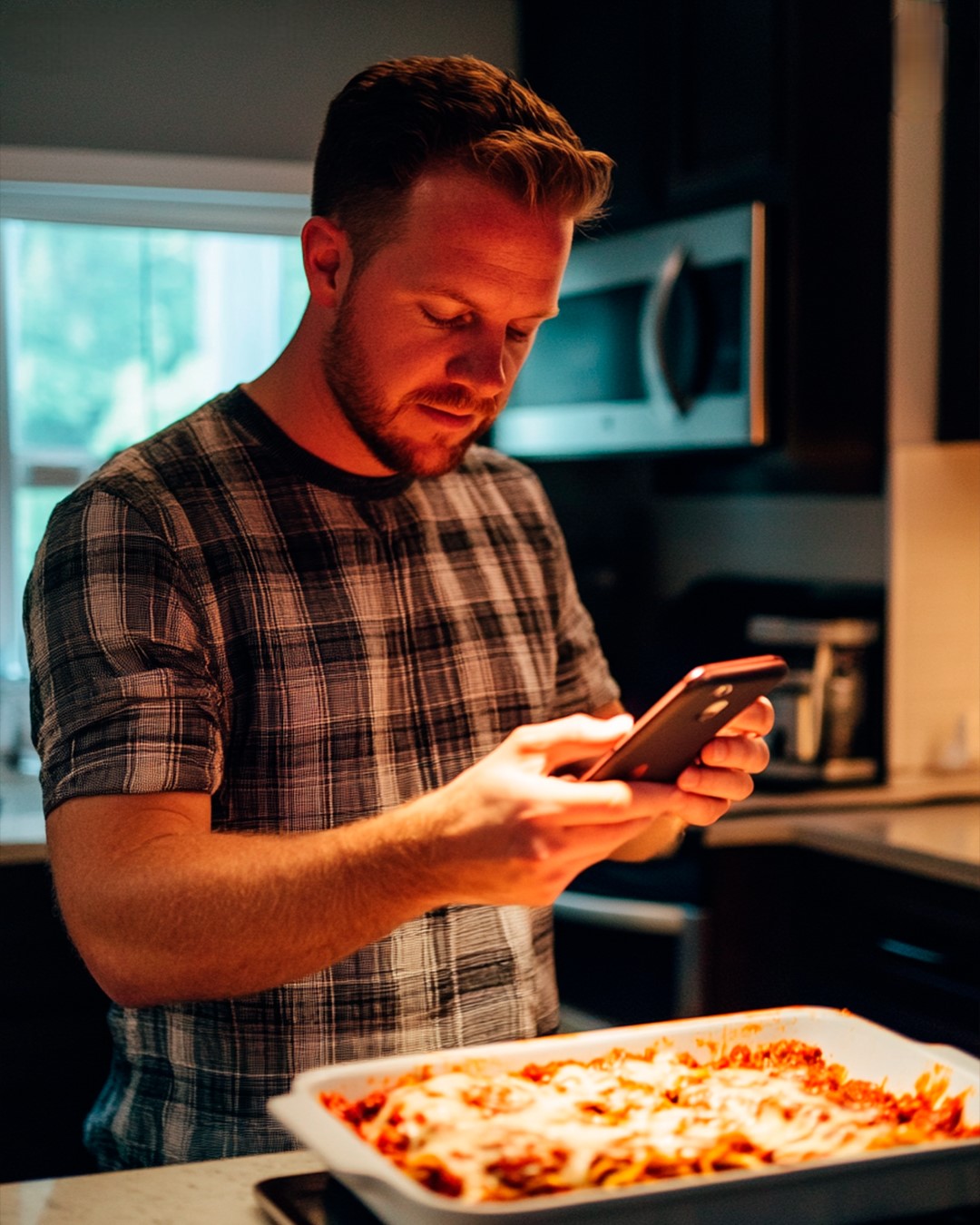Every meal I prepared felt less like an act of love and more like a test—one where I wasn’t even the one grading it. Instead, my husband, Daniel, had developed an odd habit: snapping pictures of my dishes and sending them straight to his mother for evaluation.
At first, I laughed it off, thinking it was just a harmless quirk. But over time, it became painfully clear—Carol’s opinion was the only one that mattered to him.
Cooking had always been my passion. I loved the rhythm of chopping vegetables, the comforting scent of spices blooming in hot oil, the joy of serving a meal made with care. When Daniel and I got married, preparing food became my way of creating a warm, welcoming home.
But Carol had a seat at our dinner table, even from hundreds of miles away—her presence arriving through text messages before Daniel even took a bite.
The Critiques Begin
It started innocently. One night, I made spaghetti—a simple, comforting classic. As I set the plates down, Daniel pulled out his phone.
“What are you doing?” I asked, raising an eyebrow.
“Just showing Mom,” he said casually. “She likes to know what I’m eating.”
Minutes later, his phone buzzed. He chuckled. “Mom says your sauce looks runny. Maybe use less water next time?”
I forced a smile, but a small irritation sparked in my chest. Did Carol have supernatural taste buds that worked through a screen?
And it didn’t stop there. My cookies were “overbaked,” my steak “too rare,” my chili “lacking spice.” Each meal came with a fresh critique, and Daniel, my loving husband, absorbed them like gospel.
The Breaking Point
The final straw came when I made lasagna. I spent hours perfecting the layers, simmering the sauce to rich perfection, carefully balancing ricotta and mozzarella. As expected, Daniel reached for his phone before taking a bite.
Seconds later, the verdict arrived: “Mom thinks it looks dry. Did you forget the ricotta? You know she always gets it right.”
Something inside me snapped.
“Do you even taste my food before asking your mom’s permission to like it?” I asked, my voice sharper than I intended.
He chuckled, oblivious.
That night, I lay awake, staring at the ceiling, replaying every unnecessary critique, every misplaced chuckle. I was done playing second fiddle to Carol’s long-distance judgment. It was time for Daniel to get a taste of his own medicine.
A Lesson in Perspective
The next evening, I prepared his favorite dish—Chicken Parmesan. Golden, crispy chicken, homemade marinara, bubbling mozzarella, garnished with fresh basil. When Daniel sat down, his eyes lit up.
“Wow, this looks amazing,” he said, reaching for his phone.
But I was faster. I snapped a photo first.
“What are you doing?” he asked suspiciously.
“Sending it to my mom,” I replied sweetly. But I didn’t send it to my mom—I sent it to Carol, along with a playful message: “Hi Carol! Worked really hard on this one. Should I throw it in the trash, or is it edible?”
His phone buzzed. A flush of embarrassment spread across his face as he read the message.
“Really?” he muttered.
I shrugged. “Now you know how it feels. Or should we wait for your mom’s official review before you eat?”
Daniel hesitated, then took a bite. Slowly, he admitted, “This… is really good.”
For a while, things got better. The unsolicited critiques stopped, and Daniel started complimenting my cooking without external validation.
But old habits die hard.
The Final Move
One evening, passing the living room, I overheard Daniel whispering urgently into his phone.
“No, Mom, she doesn’t want me sending pictures anymore… I’ll just do it secretly… She won’t notice…”
A sharp pang of betrayal hit me. This wasn’t just about food anymore. It was about respect—about trust.
I stepped into view. “Who are you secretly talking to?”
Daniel jumped, fumbling with his phone. “It’s just Mom… I mean, I wasn’t—”
His guilty expression said it all.
I walked away without another word, but inside, I was seething. This ridiculous game had to end.
The next night, I prepared a feast: perfectly seared steak, roasted potatoes, fresh bread, melted butter dripping into golden crevices. A dinner he couldn’t resist.
Daniel sat down, practically salivating.
“This looks incredible,” he murmured, reaching for his fork.
“Wait,” I said, picking up my phone.
He groaned. “Again?”
I smiled sweetly—but instead of photographing the food, I aimed the camera straight at him. Click.
Daniel blinked. “What are you doing?”
Without answering, I typed quickly and hit send. His phone vibrated. His face paled as he read my message:
“Hi Carol! Here’s Daniel eating my cooking. Should I let him finish, or should I starve him until he learns to appreciate me?”
He stared at me in disbelief. “You’re joking.”
I crossed my arms. “Am I?”
His phone buzzed again—Carol’s response. But this time, he didn’t check it. Instead, he picked up his fork and ate in silence.
For the first time in months, there was no picture. No critique. Just dinner.
The Sweetest Victory
From that day on, Daniel never photographed another meal. Carol stopped offering her digital opinions. Our dinner table returned to what it was meant to be—a space for warmth, laughter, and appreciation.
One evening, Daniel even cooked dinner for me—a disaster of burnt chicken, over-salted pasta, and mushy vegetables. But I smiled, took a bite, and said, “It’s really good.”
Because in the end, it wasn’t about cooking at all. It was about respect.
And that victory? It tasted sweeter than anything I had ever made.
